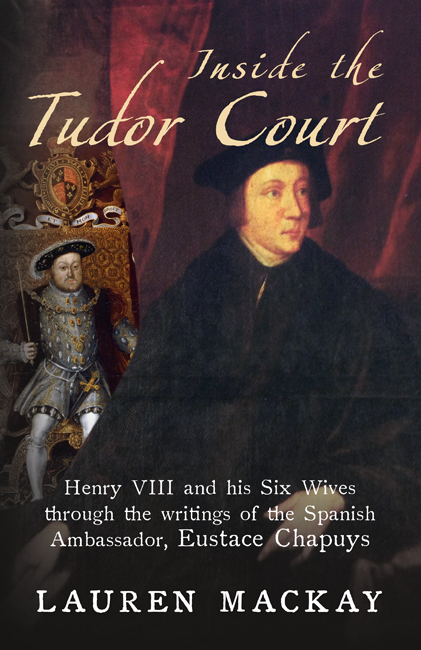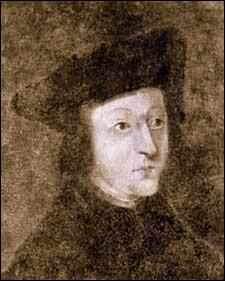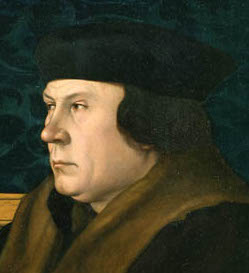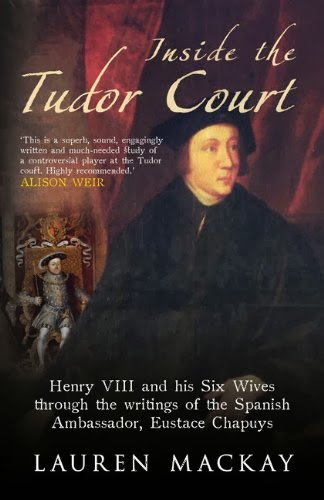 The King means it to be kept secret till Whitsuntide; but everybody begins already to murmur by suspicion, and several affirm that long before the death of the other there was some arrangement which sounds ill in the ears of the people…
The King means it to be kept secret till Whitsuntide; but everybody begins already to murmur by suspicion, and several affirm that long before the death of the other there was some arrangement which sounds ill in the ears of the people…
You can’t pick up a Tudor history book without coming across one of Eustace Chapuys’ keen observations. He spent sixteen years at the Tudor court as the ambassador for Spain, a career which observed all six of Henry’s wives and his three heirs. He is a controversial figure, author Alison Weir once dismissed him as “repeating rumours and gossip as fact”. Yet historian David Starkey insists “the despatches of one of her greatest opponents provide the most vivid picture of Anne’s (Boleyn) character and her place in events”, while Anne Boleyn’s biographer, the late Professor Eric Ives, said that “his diplomatic reports are the most continuous source for the understanding of politics and court life in England in the lifetime of Anne Boleyn.”
Just how instrumental was Chapuys in forging our modern perceptions of Henry VIII and his wives? Historian Lauren Mackay will bring us the long-overdue first full biography of one of the most colorful characters of the Tudor court. We spoke to Lauren this week about Chapuys’ lasting legacy and how he has helped us fill in the details for the last five centuries.
You have gone from researching Ancient Egypt and Greece to Medieval and Early Modern Europe. How did you become interested in the Tudor period?
Ancient Egypt has always been a passion, but medieval England became more of an obsession when I was about 12; my parents rented Kenneth Branagh’s Henry V and I was enthralled.
In such a court full of notorious figures, what was it that interested you about Eustace Chapuys in particular?
Chapuys is such a complex figure- we rely on him more than any other source, and yet his reputation has taken quite a hit in recent years, as other Tudor personalities become more popular. He certainly polarises opinion! Yet his letters contain some of the most vivid accounts of the court, Henry and his wives.
What will we learn about Eustace Chapuys from your book?
Firstly that he was incredibly charismatic, had a wonderfully acerbic wit and sense of humour!
I hope to present a more nuanced and balanced view of the man and diplomat. By going back to the original documents, rather than the 19th century translations, I aim to dispel so many of the myths that have stuck. It is time that Chapuys emerged from the realm of footnotes.
Eustace Chapuys appears as a source in every Tudor history book I have read. While historians David Starkey and Eric Ives stressed the importance of his diplomatic reports, many historians are dismissive of them as reliable evidence. Do you think this is a mistake?
I defy any scholar to attempt a Tudor biography without relying on his letters. It is simplistic to dismiss him as a source simply because he could be biased. No source will ever be unbiased, so why do we have such an unreasonable expectation of Chapuys? Chapuys was meticulous in his reports, despite the accusations of bias, and was always careful to separate fact from rumour.
Your book is divided by the reigns of Henry VIII’s queens, some periods which were well documented and many where we lack contemporary accounts. How important are reports when it comes to some of the periods we know less about?
They are vital, so much information has been lost over the centuries!
Do you think that, although he could be biased, Chapuys accounts give us a somewhat more insightful view of the Tudor court?
Absolutely, we rely on him for information about the religious and political machinations of the court, but he offers us those personal aspects that really bring the Tudor period to life- Cromwell’s shrewd brilliance, Anne’s temper, Henry’s emotional outbursts etc. History books have given us fine sketches of these larger than life personalities, but it is Chapuys who has given them their colour and texture.
Did you come across anything in Chapuy’s observations that may have changed your previous perspective?
His opinions of Anne and her family are in fact more moderate than we have come to assume, and I discuss the reasons for the particular myth that Chapuys was blinded by hatred of the Boleyns. He was also dedicated to his mother, and constantly fretted about her welfare.
Was there one fact you learned from or about Chapuy that really surprised you?
He had a penchant for a particular cheese from Geneva!
His relationship with Cromwell is especially complex, and not something that we give much thought to, but the two men were very alike, and they enjoyed a strong friendship despite working towards very different ends.
Do you think you discovered more about Eustace Chapuys the man, rather than the politician, when you were doing research for the book?
Chapuys took his responsibilities so seriously, and became so dedicated Katherine of Aragon’s cause on a personal level that it is hard to distinguish between the man and the diplomat. Certainly the man comes out much more in the original letters than the translations; his humour, anger, despair and grief are almost tangible.
 And finally, is there a question you would ask Eustace Chapuys, if you could?
And finally, is there a question you would ask Eustace Chapuys, if you could?
It is hard to settle on just one! But I would perhaps ask him about his feelings regarding Cromwell’s execution. Chapuys arrived back in England after a brief stay in Brussels, mere days before Cromwell was to be executed, but he is absolutely silent on the matter, as if he dare not write his true feelings. Or, I would ask where his son, Cesare was born, and who the mother was!
With thanks to Amberley Publishing
 Lauren Mackay is an historian whose focus of study goes beyond familiar historical figures and events to lesser known individuals, as well as beliefs, customs, and diplomacy of the 16th Century.
Lauren Mackay is an historian whose focus of study goes beyond familiar historical figures and events to lesser known individuals, as well as beliefs, customs, and diplomacy of the 16th Century.
Lauren completed her Master of History with University of New England, and is currently researching her PhD on Thomas and George Boleyn in the English Reformation, with University of Newcastle in Australia. Lauren has given several talks based on her research in the United Kingdom and Australia, and her debut book, ‘ Inside the Tudor Court: Henry VIII and his Six Wives through the Life and Writings of the Spanish Ambassador, Eustace Chapuys’ is out now.
Visit Lauren’s website at lauren-mackay.com
Lauren on Twitter
Lauren on Facebook Inside the Tudor Court

Inside the Tudor Court: Henry VIII and His Six Wives Through the Writings of the Spanish Ambassador Eustace Chapuys by Lauren Mackay, published by Amberley Publishing 2014.
The reports and despatches of Eustace Chapuys, Spanish Ambassador to Henry VIII’s court from 1529 to 1545, have been instrumental in shaping our modern interpretations of Henry VIII and his wives. As a result of his personal relationships with several of Henry’s queens, and Henry himself, his writings were filled with colourful anecdotes, salacious gossip, and personal and insightful observations of the key players at court, thus offering the single most continuous portrait of the central decades of Henry’s reign. Beginning with Chapuys’ arrival in England, in the middle of Henry VIII’s divorce from Katherine of Aragon, this book progresses through the episodic reigns of each of Henry’s queens. Chapuys tirelessly defended Katherine and later her daughter, Mary Tudor, the future Mary I. He remained as ambassador through the rise and fall of Anne Boleyn, and reported on each and every one of Henry’s subsequent wives – Jane Seymour, Anne of Cleves, Catherine Howard, and Katharine Parr – as well as that most notorious of ministers Thomas Cromwell. He retired in 1545, close to the end of Henry VIII’s reign. In approaching the period through Chapuys’ letters, Lauren Mackay provides a fresh perspective on Henry, his court and the Tudor period in general.



